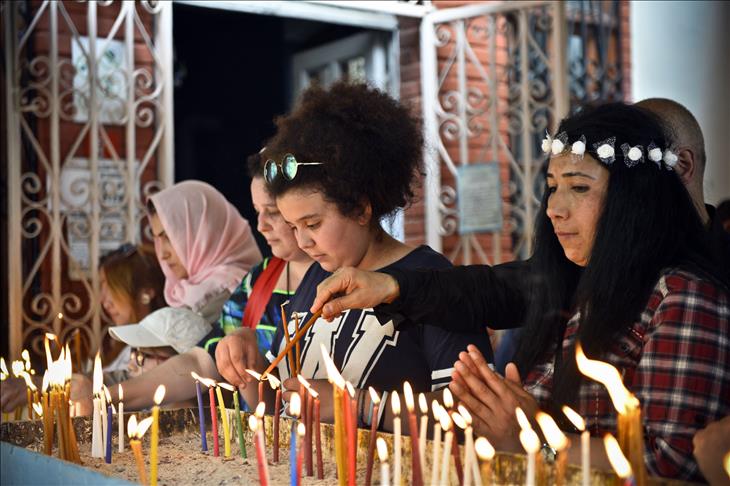
ISTANBUL
A Turkish island has played host to scenes of almost biblical proportions as thousands of people descended to take part in a very unusual religious festival which sees observant Muslims take part in an Orthodox Christian ritual.
The largest of Istanbul's Prince’s Islands – Buyukada – saw pilgrims of many faiths mixing with hordes of Istanbulites taking advantage of the Children’s Day national holiday. Throngs of people made their way to the site of an ancient monastery – Aya Yorgi – on the island’s tallest hill to make wishes.
April 23 – Saint George’s Day – is marked in other places, particularly England where he is the country’s patron saint, but the ‘Big Island’ gathering took on a much more international character.
Yucetepe was the rallying point for pilgrims to climb the 200-metre hill in sweltering heat, unwinding balls of yarn along the way in silence, some praying for health, happiness or more worldy wishes, such as a job or a new apartment.
With the Sea of Marmara and Istanbul’s islands as the backdrop, many repeated their wishes quietly after taking a vow of silence while walking up the path, loosening tiny strings along the way. The strings were knotted to a tree at the start of their hike in line with the popular belief that these actions will make their dreams and prayers become reality.
Selvi, a 52-year-old Istanbulite housewife, was performing her third pilgrimage. She told AA that performing prayers in the church did not conflict with his faith as a Muslim since "God is one and can hear you anywhere".
Selvi was exchanging her ‘wish-keys’, a tiny set of replica keys held during your prayers and later brought back to the island when your wish comes true. These are thrown into the sea, exchanged for actual keys to new apartments, something which – given Turkey’s construction boom in recent years – makes such wishes much more realizable.
The wish-keys are only one sort of desire on sale from the canny vendors who lined the route to take advantage of the massive crowds at the site. For the fortunate few whose wishes come true, cube sugars and sunflower oil are available to be doled out to fellow visitors – an obligation demanded in return for their good fortune.
Twenty-nine-year old Gözde Akyuz, who was handing out these cube sugars to other visitors, told AA that she had returned to the island site 10 years from having her wishes come true; she has graduated successfully as an engineer and now owns a house.
The story of Aya Yorgi dates back to the Middle Ages, when monks at the site buried sacred items in an effort to save them from maurauding Crusaders. According to the story, a shepherd saw Saint George who told him the burial spot.
The shepherd, as told, finds the sacred objects after walking up to the hill in silence on bare feet, digging at the spot where the church bells are heard the loudest.
The story fits in with the context of other European pilgrimages such as Reek Sunday in Ireland, when barefoot pilgrims climb 700-meter Croagh Patrick mountain and the Camino de Santiago across France and Spain, where the faithful walks the holy route which runs for almost 800 km.
Not everyone was truly a believer in the wish-keys or the strings strewn along the path to Aya Yorgi. Standing by the side of the route, noting down prayer requests from visitors was Luke Creighton, an American who has taught English in Turkey for five years. Creighton said these acts reveal people to be desperately in need of help and peace and who would do whatever it takes to find it.
Creighton was far from being the only foreigner at the site; many groups and organizations including Turkish-Christian churches and even Korean-American Christians were among those who braved the crowds.
A pastor from one of California's Korean congregations, Paul Kim, was surprised by the participation of Muslim Turks in personal prayer sessions being performed by some of his compatriots along the path, where many were singing hymns both in English and Korean.
Amid all these holy festivities some people had more earthly issues on their mind; at the bottom of Yucetepe hill, horse carriage drivers, more used to taking tourists around the island, were enjoying the good business brought by the faithful needing transportation. One told AA that he expected to make 1,000 liras – an average monthly salary in Turkey – in one day alone, perhaps proving that, sometimes, God and mammon can be strung together.
englishnews@aa.com.tr
Anadolu Agency website contains only a portion of the news stories offered to subscribers in the AA News Broadcasting System (HAS), and in summarized form. Please contact us for subscription options.

